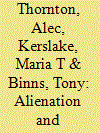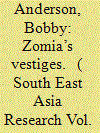|
|
|
Sort Order |
|
|
|
Items / Page
|
|
|
|
|
|
|
| Srl | Item |
| 1 |
ID:
095584


|
|
|
|
|
| Publication |
2010.
|
| Summary/Abstract |
This paper will explore social change in contemporary Samoan society with respect to the traditional expectations of the church and kinship conflicting with the modern needs of an urbanising population. In the Samoan way of life - the fa'aSamoa - religion, matai (chiefly system) and reciprocal 'gift-giving' kinship arrangements among the aiga (extended family) are fundamental and closely related elements. However, pressures from continued integration into the global economy, the importance of remittance income and related migration of well-educated and highly skilled Samoans overseas are presenting several challenges to the strongly held traditions of kinship and church obligations. Among these challenges, low-income households are increasingly placing the material well-being of the immediate household first, thus 'opting out' of the culturally defined primary obligation to the church and risk alienation from beneficial familial ties. As a result, settlement patterns are shifting towards leaseholds in urbanising Apia, with consequences, we will speculate, that may have deeper cultural implications. Our research revealed that the church has been slow to accept that, increasingly, Samoans are seeking relief from hardships that spirituality alone cannot address. However, given its influence, strengths and resources, the church is well positioned to take a lead role in facilitating opportunities for 'bottom-up', alternative development in Samoa, as well as providing lessons for church-led participatory approaches in the Pacific Island Region.
|
|
|
|
|
|
|
|
|
|
|
|
|
|
|
|
| 2 |
ID:
158204


|
|
|
|
|
| Summary/Abstract |
Opium poppy cultivation in Thailand fell from 12,112 hectares in 1961 to 281 hectares in 2015. One outlier exists: Chiang Mai Province’s remote southwestern district, Omkoi. Ninety percent of the district is a national forest reserve where human habitation is illegal. However, an ethnic Karen population has lived there since long before the law that outlawed them was created, unconnected to the state by road, with limited or no access to health, education and other services. Omkoi’s Karen increasingly rely on cash-based markets. Their lack of citizenship precludes them from land tenure that might incentivize them to grow alternative crops, and their statelessness precludes them from services and protections. Nor is the Thai state the singular Leviathan that states are often assumed to be; it is a collection of agencies and networks with divergent interests, of whom one of the most powerful, the Royal Forestry Department, has purposely made Omkoi’s population illegible, and has consistently blocked the attempts of other state actors to complexify Omkoi beyond the simplicity of its forest environment. These factors make the state illegitimate to Omkoi’s Karen just as Omkoi’s Karen are illegitimate to the state, and make the cultivation of short-term, high-yield, high-value, imperishable opium a logical economic choice for poor Karen farmers, especially given the historical lack of law enforcement presence. However, that presence is growing, as Omkoi becomes one of the last areas of Thailand to experience the historical extension of lowland Padi state power into an ungoverned, untallied highland.
|
|
|
|
|
|
|
|
|
|
|
|
|
|
|
|
|
|
|
|
|